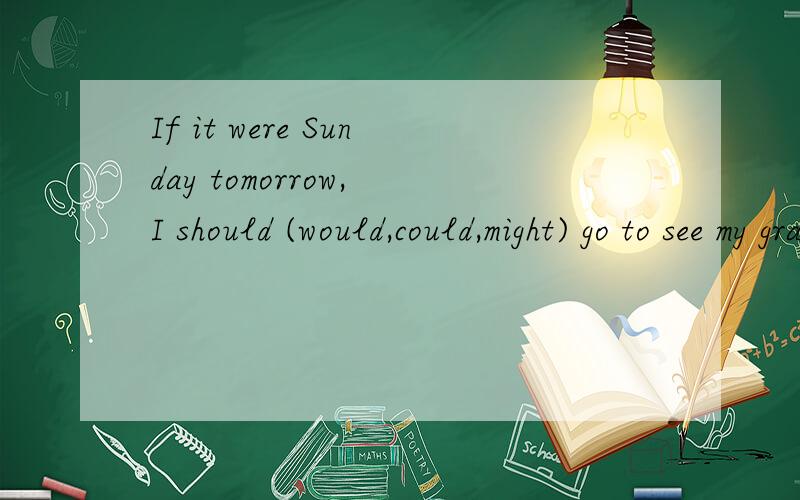If it were Sunday tomorrow, I should (would,could,might) go to see my grandmother.жӯӨеҸҘејҸеҜ№е°ҶжқҘдәӢе®һзҡ„еҒҮи®ҫ,д»ҺеҸҘдёӯжҖҺд№ҲеҸҜд»Ҙз”ЁwereиЎЁзӨә,дёҚзҗҶи§Ј,и°ўи°ў
жқҘжәҗпјҡеӯҰз”ҹдҪңдёҡеё®еҠ©зҪ‘ зј–иҫ‘пјҡдҪңдёҡеё® ж—¶й—ҙпјҡ2024/12/02 23:11:41

If it were Sunday tomorrow, I should (would,could,might) go to see my grandmother.жӯӨеҸҘејҸеҜ№е°ҶжқҘдәӢе®һзҡ„еҒҮи®ҫ,д»ҺеҸҘдёӯжҖҺд№ҲеҸҜд»Ҙз”ЁwereиЎЁзӨә,дёҚзҗҶи§Ј,и°ўи°ў
If it were Sunday tomorrow, I should (would,could,might) go to see my grandmother.
жӯӨеҸҘејҸеҜ№е°ҶжқҘдәӢе®һзҡ„еҒҮи®ҫ,д»ҺеҸҘдёӯжҖҺд№ҲеҸҜд»Ҙз”ЁwereиЎЁзӨә,дёҚзҗҶи§Ј,и°ўи°ў
If it were Sunday tomorrow, I should (would,could,might) go to see my grandmother.жӯӨеҸҘејҸеҜ№е°ҶжқҘдәӢе®һзҡ„еҒҮи®ҫ,д»ҺеҸҘдёӯжҖҺд№ҲеҸҜд»Ҙз”ЁwereиЎЁзӨә,дёҚзҗҶи§Ј,и°ўи°ў
1.дёҺзҺ°еңЁдәӢе®һзӣёеҸҚ
If+S+иҝҮеҺ»ејҸеҠЁиҜҚ,S+would(could ,should, might)+еҺҹеһӢеҠЁиҜҚ
дҫӢеҰӮ:If I were rich,I would help you.
еӣ дёәзҺ°еңЁжҲ‘дёҚжңүй’ұ,жүҖд»ҘжҳҜдёҺзҺ°еңЁдәӢе®һзӣёеҸҚзҡ„з”Ёжі•
2.дёҺиҝҮеҺ»дәӢе®һзӣёеҸҚ
If+S+иҝҮеҺ»е®ҢжҲҗејҸ,S+would(could ,should, might)+have+p.p
дҫӢеҰӮ:If he had told me the truth,I would not have made the mistake.
еӣ дёәе·Із»ҸжҳҜиҝҮеҺ»зҡ„дәӢдәҶ,жүҖд»ҘеҒҮи®ҫеҸҘдёҖеҫӢз”Ёе®ҢжҲҗејҸ
3.дёҺжңӘжқҘдәӢе®һзӣёеҸҚ
иЎЁзӨәеҜ№жңӘжқҘдәӢжғ…зҡ„еҒҮи®ҫ,е®һйҷ…дёҠз»қдёҚеҸҜиғҪеҸ‘з”ҹ.
If+S+were to +V,S+would(could, should, might)+еҺҹеһӢеҠЁиҜҚ
дҫӢеҰӮ:If you were going to part with us , she would be canceling the date.
еҰӮжһңдҪ д»Ҡжҷҡи·ҹжҲ‘们дёҖиө·еҺ»жҙҫеҜ№, еҘ№е°ұиҰҒеҸ–ж¶ҲеҘ№зҡ„зәҰдјҡ.
4.зҺ°еңЁжҲ–жңӘжқҘеҸҜиғҪеҸ‘з”ҹзҡ„зҠ¶еҶө
If+S+зҺ°еңЁејҸеҠЁиҜҚ,S+ зҘҲдҪҝеҸҘ жҲ– will(can,may,shall )+еҺҹеһӢеҠЁиҜҚ
дҫӢеҰӮ:If it rains tomorrow,I shall not go.
иҝҷжҳҜиҷҡжӢҹиҜӯж°”
if+дё»иҜӯ+иҝҮеҺ»ж—¶+е…¶д»–+дё»иҜӯ+should/would/could/might+do+е…¶д»–
дҫӢпјҡ
If I were you, I would take an umbrella.еҰӮжһңжҲ‘жҳҜдҪ пјҢжҲ‘дјҡеёҰжҠҠдјһгҖӮпјҲдәӢе®һпјҡжҲ‘дёҚеҸҜиғҪжҳҜдҪ пјү
жҳҺеӨ©ж°ёиҝңдёҚеҸҜиғҪжҳҜжҳҹжңҹеӨ© иҝҷжҳҜдёҖдёӘдәӢе®һ иҖҢдёҚдёҖе®ҡиҰҒз”Ёе°ҶжқҘзҡ„еҒҮи®ҫе•Ҡ еҸҜд»Ҙе•Ҡ